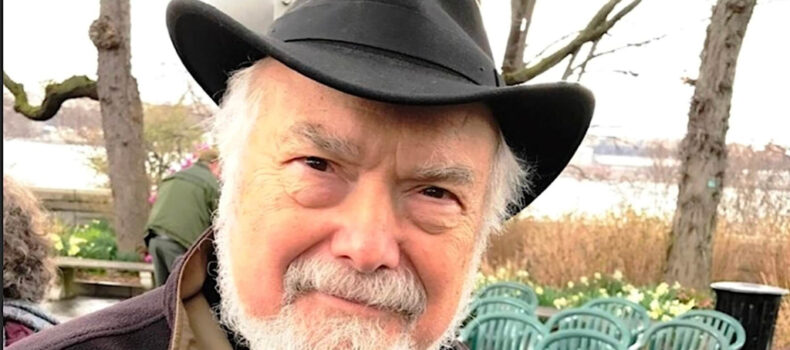The Legacy of Menachem Mike Fox Z”L
 National Yiddish Theatre Folksbiene mourns the passing of Menachem Mike Fox. Mike was a dedicated performer and teacher of Yiddish folk song, a poet, and one of the creators of Kids and Yiddish presented by NYTF for over a decade with new editions annually.
National Yiddish Theatre Folksbiene mourns the passing of Menachem Mike Fox. Mike was a dedicated performer and teacher of Yiddish folk song, a poet, and one of the creators of Kids and Yiddish presented by NYTF for over a decade with new editions annually.
Mike gave the world a great gift with his song Regnboygn (A Rainbow) which is performed regularly at NYTF events and by Yiddish groups around the globe. The song captures our highest aspirations for unity among all people in a peaceful and loving world. This video performance of Regnboygn, recorded last summer, features a new generation of young talent— Yosef Kogan, violin and singers Margot Weintraub and Yair Keydar, with Zalmen Mlotek on piano.
Michael (Menachem) Fox was not just a man; he was a movement. A figure of quiet strength, Menachem carried himself with the kind of humility that belied his enormous influence on those who were fortunate enough to know him. His life was a symphony of purpose, love, and a devotion to making the world a better place.
Born into a family of Yiddish speakers, Menachem grew up steeped in the rich traditions of Eastern European Jewish culture. His parents, both immigrants who had endured the hardships of displacement, passed down not only the language of their ancestors but also the resilience and wisdom that came with it. Yiddish was the language of his childhood—of warmth, humor, and heartfelt conversation. It was through Yiddish that Menachem learned the proverbs and stories that would guide his life, including his favorite: “Az men shteyt tsuzamen, ken men iberlebn aleys”—”If we stand together, we can overcome anything.”
This philosophy shaped his journey from boyhood to adulthood and became the cornerstone of his life’s work.
Menachem was a teacher, but not in the traditional sense. While he spent years as a beloved educator in classrooms, his lessons extended far beyond academic walls. Often, he would sprinkle his teachings with Yiddish phrases, delighting his students with expressions that carried a deep sense of history and wisdom. “He would always say, ‘Azoy geyt es, kinder,’” one former student shared at his memorial, recalling the phrase that loosely means, “That’s how life goes, kids.” “It wasn’t just the words; it was how he made you feel when he said them—like you were part of something bigger.”
Outside the classroom, Menachem was a pillar of his community. He founded initiatives to provide food for families in need, helped young people navigate challenges, and was known for his ability to unite people around causes that mattered. Whether organizing charity drives or leading interfaith dialogues, he approached every endeavor with unwavering compassion and a sense of humor often laced with a Yiddish quip that left everyone smiling.
But it wasn’t just his public life that defined him. At home, Menachem was a loving husband to Miriam, his wife of 45 years, and a devoted father and grandfather. To his family, Yiddish was more than a language; it was the glue that connected generations. He would tell stories of the alte heym (old home) and sing Yiddish lullabies to his grandchildren, filling their hearts with a love for their heritage.
As he aged, Menachem often reflected on the importance of leaving the world better than he found it. His actions spoke to this desire, but so did his words. He often said, “A mentsh iz nisht fun zayn nomen, nor fun zayne maysem”—”A person is not defined by their name but by their deeds.”
On a cold January morning, Menachem quietly passed away at the age of 76. The news of his death spread quickly, and within hours, the community he had spent a lifetime building came together to mourn the loss of a remarkable man.
At his funeral, hundreds gathered—family, friends, former students, and community members—all with stories of how Menachem had touched their lives. Miriam, standing with their children and grandchildren, spoke through tears. “Menachem’s love was boundless, his kindness endless. He gave so much of himself to us, to all of you. And though he is gone, his spirit will forever guide us.”
The tributes poured in, each one painting a picture of a man whose impact would not fade with his passing. A park bench was dedicated in his honor, inscribed with his favorite saying: “Love is the legacy we leave behind,” written both in English and in Yiddish: “Di libe iz di yerushe vos mir lozn.”
Though Michael (Menachem) Fox is no longer here in body, his spirit remains a guiding light. His life reminds us that one person’s compassion—rooted in tradition, language, and love—can ripple through generations, creating a world that is kinder, brighter, and more connected.

